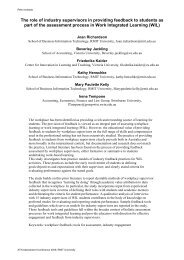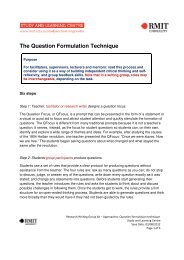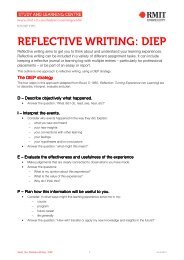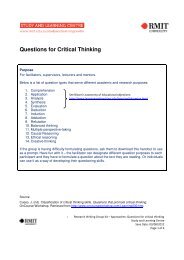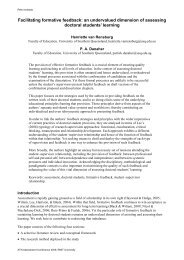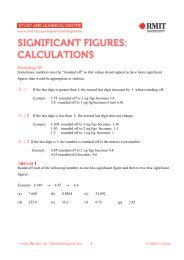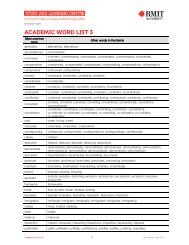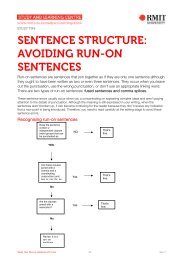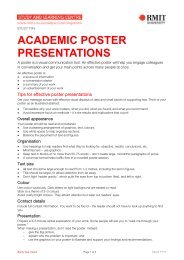student feedback and leadership - Office for Learning and Teaching
student feedback and leadership - Office for Learning and Teaching
student feedback and leadership - Office for Learning and Teaching
You also want an ePaper? Increase the reach of your titles
YUMPU automatically turns print PDFs into web optimized ePapers that Google loves.
Student Feedback & Leadership<br />
II.<br />
III.<br />
Project Team meetings were identified as providing regular opportunities<br />
<strong>for</strong> service providers <strong>and</strong> academic leaders (Heads of School) to meet<br />
face-to-face, to discuss <strong>and</strong> problem-solve issues, <strong>and</strong> to take other<br />
issues back to the areas responsible <strong>for</strong> further discussion. Discussion<br />
advanced from the more traditional ‘blame’ <strong>and</strong> ‘whinge’ focus to joint<br />
problem solving. One example cited was the discussion over the use<br />
of AV/IT equipment in teaching spaces that resulted in the production<br />
of Venue Sheets with details of resources <strong>and</strong> instructions on how<br />
to use the equipment to be displayed in each venue <strong>and</strong> on the website.<br />
Plenary sessions organised differently as small group activities were<br />
identified as providing <strong>for</strong> much more in<strong>for</strong>med discussion than traditional<br />
presentations followed by a question <strong>and</strong> answer session.<br />
4.2 Outcome 2: Multi-level Approaches <strong>and</strong><br />
Strategies to Effect Change Management<br />
While it is recognised that the change management strategy implemented<br />
across the university through the various teams established as part of the<br />
project is not a fait accompli, the changes achieved were substantive <strong>and</strong><br />
establish the basis <strong>for</strong> further ongoing change.<br />
4.2.1 Critical Success Factors (CSFs)<br />
The Critical Success Factors <strong>for</strong> the change management strategy to improve<br />
<strong>student</strong> <strong>feedback</strong> suggest that effective change management requires the<br />
individual academic to be supported by a multi-level <strong>leadership</strong> approach<br />
if a distributed <strong>leadership</strong> framework is to be effective. The CSFs<br />
identified include:<br />
I. Recognition<br />
Recognition <strong>and</strong> reward of individual <strong>and</strong> team contributions requires<br />
further change to accord learning <strong>and</strong> teaching excellence to be<br />
considered equal to research.<br />
II.<br />
Encouragement<br />
Resource support <strong>for</strong> individuals <strong>and</strong> teams to design <strong>and</strong> develop<br />
innovative approaches to improving the <strong>student</strong> learning experience<br />
is evidenced. This requires new approaches to resource distribution<br />
that take into account the need to provide time <strong>and</strong> finance <strong>for</strong><br />
individual academics to design, develop, trial <strong>and</strong> evaluate<br />
new initiatives.<br />
Page 70



